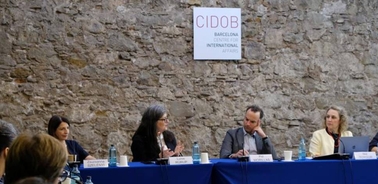Tackling the impacts of the EU Parliament elections in the 2024 Future of Europe Debates

The Global Policy Center (GPC) at IE School of Politics, Economics & Global Affairs recently launched the 2024 Madrid & Barcelona Future of Europe Debates project. This unique initiative is a collaboration between the GPC, the Barcelona Centre for International Affairs (CIDOB) and the Friedrich-Ebert-Stiftung Madrid (FES).
The Global Policy Center (GPC) at IE School of Politics, Economics & Global Affairs recently launched the 2024 Madrid & Barcelona Future of Europe Debates project. This unique initiative is a collaboration between the GPC, the Barcelona Centre for International Affairs (CIDOB) and the Friedrich-Ebert-Stiftung Madrid (FES).
The second debate, hosted by CIDOB in Barcelona in June 2024, consisted of three panels focusing on different aspects of the European Parliament 2024 elections.
As noted in the debate, the future of the EU depends on aligning citizens' preferences with EU policies. Despite a rising voter turnout, the EU must rethink its democracy model to foster active participation, bridge the gap between citizens and elites, and build trust in institutions. Effective policies that reflect diverse needs, especially between urban and rural communities, are essential.
Panellists also highlighted that the new EU institutional setup grants the EPP significant influence, prioritizing budget expansion, Ukraine's accession, and a cohesive foreign policy. Budget negotiations will be tough, and while digital and green policies will stay steady, the focus will be on implementing existing policies rather than new proposals. The European Council will retain the upper hand in foreign policy and budgets but face more decision-making challenges.
The categorization and impact of the rise of the far right on the EU’s foreign policy was also debated: the acceptability of these parties significantly hinges on their foreign policy positions. The European political center has adopted some far-right stances in foreign policy due to electoral competition, and it remains to be seen whether far-right parties will moderate or push for broader changes. Their anti-establishment views often clash with principles of liberal democracies, particularly on issues like Russia.